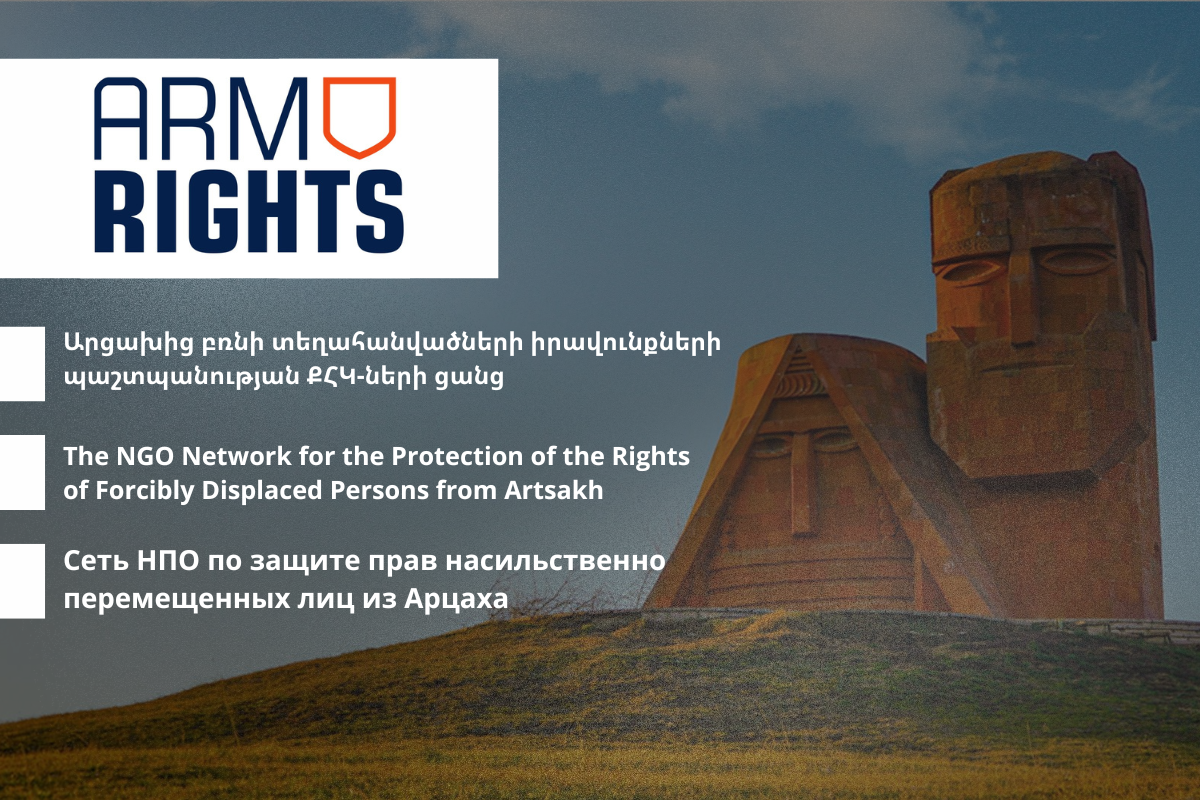Statement On Condemning the Ongoing Atrocities and Vandalism Against the Cultural Heritage of Artsakh (Nagorno-Karabakh)

The NGO Network for the Protection of the Rights of Forcibly Displaced Persons from Artsakh condemns the ongoing atrocities and vandalism carried out by Azerbaijan against the cultural heritage of Artsakh.
The historical and cultural wealth passed down to us through generations of Armenia and the Armenian people is today under threat and subjected to illegal and inhumane actions by Azerbaijan.
The cultural heritage of Artsakh and the region has suffered irreversible losses over the past 30 years at the hands of Azerbaijan, especially in the Nakhichevan Autonomous Republic, where 89 Armenian churches, 20,000 graves, and more than 5,000 khachkars (cross-stones) have been destroyed.
Since the ceasefire of November 9, 2020, 1,456 historical and cultural monuments, mainly Armenian, have come under Azerbaijani control, and Azerbaijan has caused significant and intentional damage to Armenian cultural heritage.
The systematic nature of the destruction of Armenian cultural heritage
- Systematic nature:
- The damages and destructions affect numerous monuments in different areas,
- Objects bearing Armenian cultural codes (churches, khachkars, cemeteries) have been especially destroyed,
- Most of the destruction took place after the end of active military operations.
- Eyewitness accounts:
- Local residents and international observers have confirmed cases of vandalism and destruction of monuments.
- Specific examples:
- Targeted shelling of the Holy Savior (Ghazanchetsots) Cathedral in Shushi,
- Destruction of the Armenian Genocide and War Victims Memorial in Shushi,
- Demolition of the Green Hour Church in Shushi,
- Disappearance of the St. Zoravor Astvatsatsin Church in Jabrayil,
- Destruction of the 12th-century historical Khudaferin Bridge,
- Destruction of the 12th-century Julfa Cemetery,
- Damage or destruction of other churches, khachkars, and historical monuments (e.g., churches in Mekhakavan, Mataghis).
These actions testify to systematic steps directed against Armenian cultural heritage, endangering not only Armenian but also world cultural values.
It is condemnable that the Azerbaijani state regime, in violation of international law, is consistently erasing not only the Armenian presence and history in the occupied territory of Artsakh but also complexes and statues related to Armenian citizens of other countries who are great guarantors of world history and culture. The latest victims of Azerbaijan's cultural genocide are the statue of Soviet Union Marshal, twice Hero of the Soviet Union, Deputy Minister of Defense of the USSR Hovhannes Khachaturovich Baghramyan, the statue of American citizen, great philanthropist and inventor Alex Manoogian near the Paul Eluard Francophonie Center in Stepanakert, and the monument to the world-renowned chansonnier, French citizen, legendary Charles Aznavour.
It is well known that the norms of International Humanitarian Law take the protection of cultural objects during armed conflicts under their protection, and Article 8 of the Statute of the International Criminal Court considers the destruction of cultural heritage in occupied territories an international war crime. Nevertheless, the Azerbaijani obsession with erasing the Armenian trace does not recognize any human or universal, international or domestic, global or moral boundaries.
The calls and resolutions of international structures directed at Azerbaijan to refrain from further destruction, neglect, or alteration of cultural, religious, or historical heritage sources in the region, which are based on such important international documents and well-known principles as the decisions of the International Court of Justice (ICJ), EU Council conclusions, UNESCO conventions and declarations, UN and Hague conventions and protocols, the "Universal Declaration of Human Rights," international conventions and European Union principles, continue to remain without consequence.
Despite the seriousness of the situation, no large-scale international investigations are being conducted to confirm the facts of the destruction of cultural monuments. Nevertheless, several international organizations and countries continue to express concern in this regard. The European Parliament has adopted several resolutions condemning Azerbaijan's actions and calls for the protection of Armenian cultural heritage. International human rights organizations such as Amnesty International, Human Rights Watch, and others have expressed concern about reports of destruction and called for an independent investigation.
We call on all international, regional, state, and national actors in the protection of cultural heritage, particularly UNESCO (United Nations Educational, Scientific and Cultural Organization), ICOMOS (International Council on Monuments and Sites), Blue Shield International, Council of Europe, and all rights defenders to intervene immediately and prevent this terrible process.
Our demand is that Azerbaijan cease the destruction of cultural heritage in Artsakh and ensure the preservation of objects constituting cultural heritage in accordance with the principles and standards of international law.
The NGO Network for the Protection of the Rights of Forcibly Displaced Persons from Artsakh is ready to cooperate with all interested parties to protect the sources of cultural, religious, or historical heritage in the region from further destruction, neglect, or alteration.
The statement was adopted by the governing board of the NGO Network for the Protection of the Rights of Forcibly Displaced Persons from Artsakh (hereinafter referred to as the Network) on September 20, 2024. The Network was founded on March 20, 2024. The main goal of the Network is to strengthen the mechanisms for protecting the rights of forcibly displaced persons from Artsakh.
The secretariat functions of the Network are carried out by the Armenian Lawyers' Association(hereinafter referred to as ALA). Since 2014, ALA has held special consultative status with the UN Economic and Social Council.